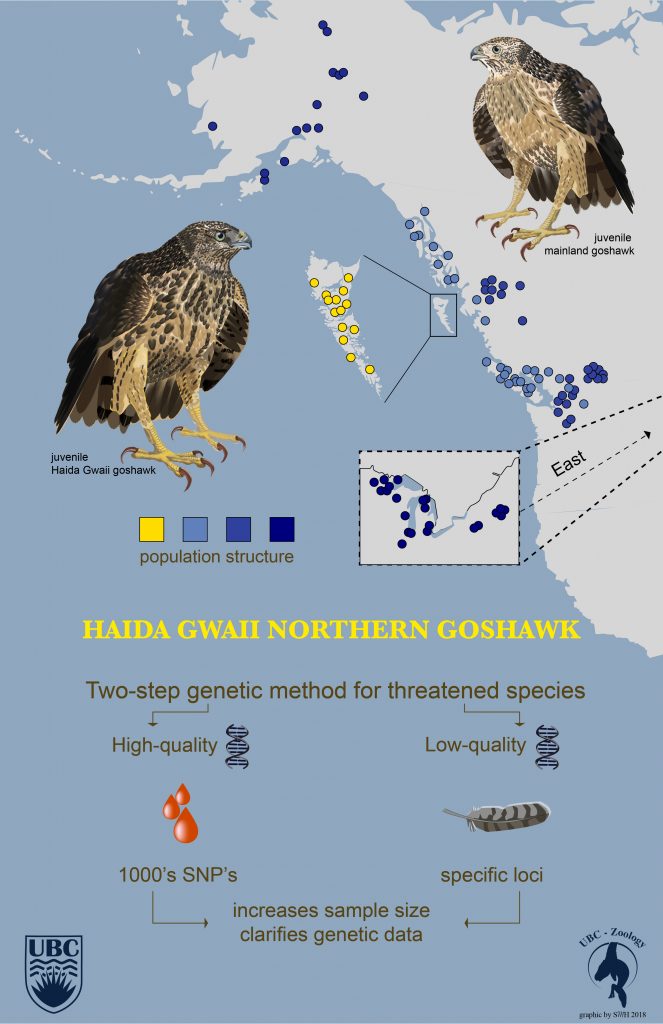This week, our paper on genomic differentiation of Northern Goshawks was published. Sylvia Heredia of UBC Biology produced this wonderful graphic that summarizes the paper:

The Abstract:
Accurate knowledge of geographic ranges and genetic relationships among populations is important when managing a species or population of conservation concern. Along the western coast of Canada, a subspecies of the northern goshawk (Accipiter gentilis laingi) is legally designated as Threatened. The range and distinctness of this form, in comparison with the broadly distributed North American subspecies (Accipiter gentilis atricapillus), is unclear. Given this morphological uncertainty, we analyzed genomic relationships in thousands of single nucleotide polymorphisms identified using genotypingâ€byâ€sequencing of highâ€quality genetic samples. Results revealed a genetically distinct population of northern goshawks on the archipelago of Haida Gwaii and subtle structuring among other North American sampling regions. We then developed genotyping assays for ten loci that are highly differentiated between the two main genetic clusters, allowing inclusion of hundreds of lowâ€quality samples and confirming that the distinct genetic cluster is restricted to Haida Gwaii. As the laingi form was originally described as being based on Haida Gwaii (where the type specimen is from), further morphological analysis may result in this name being restricted to the Haida Gwaii genetic cluster. Regardless of taxonomic treatment, the distinct Haida Gwaii genetic cluster along with the small and declining population size of the Haida Gwaii population suggests a high risk of extinction of an ecologically and genetically distinct form of northern goshawk. Outside of Haida Gwaii, sampling regions along the coast of BC and southeast Alaska (often considered regions inhabited by laingi) show some subtle differentiation from other North American regions. These results will increase the effectiveness of conservation management of northern goshawks in northwestern North America. More broadly, other conservationâ€related studies of genetic variation may benefit from the twoâ€step approach we employed that first surveys genomic variation using highâ€quality samples and then genotypes lowâ€quality samples at particularly informative loci.
The citation and link:
Geraldes, A.*, K. Askelson*, E. Nikelski, F.I. Doyle, W.L. Harrower, K. Winker, and D.E. Irwin. 2018. Population genomic analyses reveal a highly differentiated and endangered genetic cluster of northern goshawks (Accipiter gentilis laingi) in Haida Gwaii. Evolutionary Applications, online Early View: https://doi.org/10.1111/eva.12754. (*Shared first authorship)
The UBC press release: https://science.ubc.ca/news/haida-gwaiis-northern-goshawks-highly-distinct-and-risk
Media coverage:
CBC Radio interviews
CBC article by The Canadian Press
We thank the many sample contributors for their contributions to this study (see the Acknowledgements section of the paper).
This research was funded by grants from Genome British Columbia; British Columbia Ministry of Forests, Lands and Natural Resource Operations; Coast Forest Products Association; Western Forest Products; and the Natural Sciences and Engineering Research Council of Canada.
